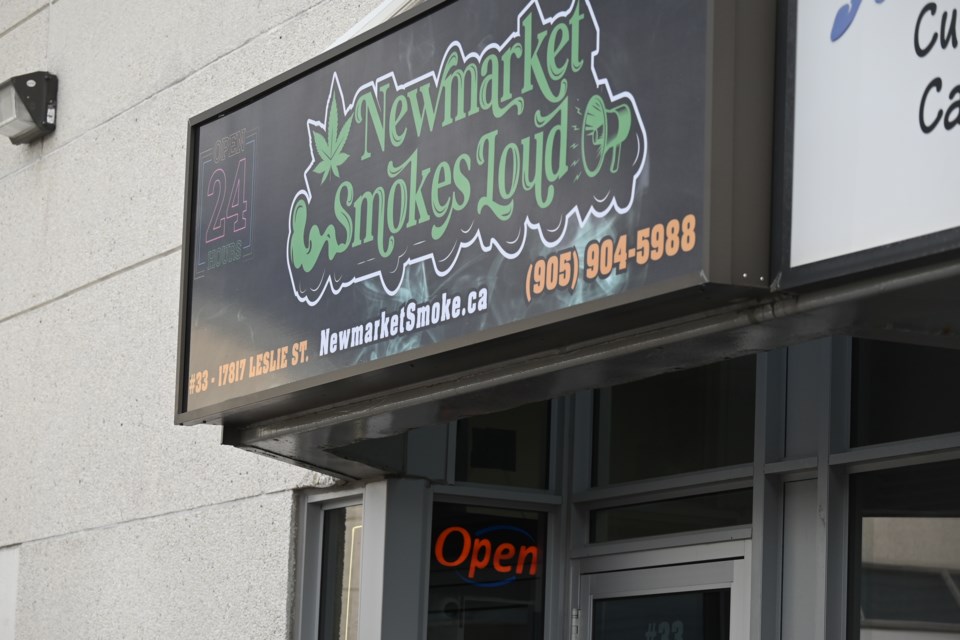Retail cannabis worker and advocate Rianna Ford was reminded of her hometown when a cannabis store opened in Newmarket, despite the town opting out of the retail option.
The Mississauga native said she saw illegal stores catering to locals, while the city disallowed legal ones, something she did not think made sense. This year, she and other advocates asked the City of Mississauga to reconsider allowing cannabis stores — which the city eventually did in April.
Now, Ford hopes to make the same thing happen for the York Region municipalities that have opted out of cannabis stores, including Newmarket.
She described in Mississauga there was an illicit store that “was constantly raided, constantly closed down. However, it would pop right back up,” she said. “Why can’t you even provide a healthy option to have a legal competitor? To hear how law enforcement is still having this issue, it’s disheartening.”
Ford hopes to convince York Region municipalities who opted out of retail cannabis to put the matter up for reconsideration. Already turned down by Vaughan council, she is presenting to Richmond Hill this month and has asked for a delegation in Newmarket as well.
The cannabis issue came up in Newmarket this week after Newmarket Smokes Out, opened Oct. 20. Despite the town having opted out of allowing retail cannabis in 2019 — which the province gave the choice after cannibis became legal — the store has openly been selling cannabis. York Regional Police said this week it is investigating, but as of Nov. 10, the store remains open.
While some neighbouring communities like Aurora and Bradford have allowed retail cannabis, other communities like Newmarket and Richmond Hill have not. It is a position that Newmarket Mayor John Taylor has stood by in the years since. Taylor said there is a concern with planning control, with the Alcohol and Gaming Commission of Ontario (AGCO) maintaining licensing as opposed to municipalities.
“If we allow cannabis stores, a provincial agency could approve eight stores on Main Street, and we would have no grounds upon which to object,” Taylor said earlier this week. “I do not think anyone would see that as a positive outcome.”
But Ford said the cannabis market has matured since the early days of retail legalization. While many rushed to open stores in a “gold rush” at the beginning, she said some of the stores have since closed. The same sense of a gold rush does not exist today, she added.
The AGCO has listed 21 retail cannabis locations authorized to open in Mississauga, with more than 710,000 residents as of 2021. Another 19 are listed as either in progress or are in the midst of an approval process with public notice dates posted.
“The margins of operating a retail store isn’t appealing to a lot of business owners either,” Ford said. “Truthfully, we’re one of the most stigmatized businesses.”
Newmarket residents can still get access to cannabis through neighbouring communities like Aurora. Some places also offer delivery services.
But Ford said having a local store can make a difference. She said older people pursuing it to address pain would appreciate a local option from a reputable operator they can get to know and avoid having to travel for it.
AGCO has a ‘rigorous process’
Stores are not simply allowed to open, even in communities that allow retail cannabis. They have to go through a process of getting registered and approved with the AGCO, with a 15-day public notice and input period before a store can open.
“The licensing of retail cannabis stores in Ontario is a thorough and rigorous process,” the AGCO communications team said. “AGCO only licenses applicants who meet all legal and regulatory requirements.”
Before issuing a licence, the AGCO does a “comprehensive assessment,” including police and background checks. Operators must first get a licence for retail cannabis, and then a store authorization at their proposed location.
Regulations state that stores can be allowed anywhere other retail stores are allowed, provided a municipality has opted in, but with a minimum 150-metre buffer between cannabis stores and schools., Beyond that, AGCO has no cap on the number of stores in a given region.
The AGCO would not approve any retail store authorization to a community that has opted out of retail cannabis.
“The AGCO’s focus is on the safe, responsible and lawful sale of cannabis, and the prevention of legal cannabis being diverted to the illicit market, consistent with legislation enacted by the provincial government.”
Advocacy to come
Ford hopes to persuade municipalities to make a reconsideration motion. As occurred in Mississauga, it would entail directing staff to come back with updated information on retail cannabis to consider the issue of opting in or out again.
She did not succeed in Vaughan last month, which she said was due in part to a lack of public concern in the matter. But she said that is something she hopes can be addressed.
“It’s a ground game,” she said, adding she hopes to engage citizens in Vaughan to communicate with their councillors about it. “Get a bit more in their face, and hopefully, we can come back.”
Although Ford does not have a date for a delegation to Newmarket yet, the town confirmed it is reviewing scheduling for her.
She said legalizing retail cannabis in Mississauga has helped push back the illegal market.
“This is just for me, my passion project,” Ford said. “Legal cannabis is more than just providing recreational weed. It’s really wellness.”
